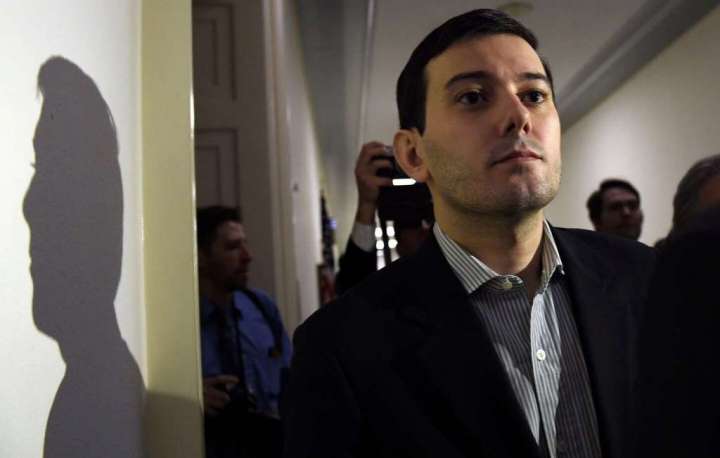Martin Shkreli, the former hedge fund executive who became a symbol of Wall Street greed and excess after his company purchased a lifesaving medication and hiked its price hundreds of times over, has been released early from prison.
Martin Shkreli, Wall Street’s ‘Pharma Bro,’ is out of prison early

“I am pleased to report that Martin Shkreli has been released from Allenwood prison and transferred to a [Bureau of Prisons] halfway house after completing all programs that allowed for his prison sentence to be shortened,” his lawyer, Benjamin Brafman, said in a statement.
Images of Shkreli — one inside a vehicle and one inside a restaurant — were posted Wednesday on Twitter by Edmund Sullivan, who wore a shirt emblazoned with the words “FREE SHKRELI.”
Brafman said he has encouraged Shkreli not to make any statements to the media while he is in the halfway house.
Donald Murphy, a spokesman for the Federal Bureau of Prisons, said Shkreli will remain in the halfway house until mid-September.
Murphy did not answer questions with respect to which specific programs facilitated Shkreli’s transfer to a halfway house, citing Shkreli’s privacy and safety. He added, however, that it is the prison bureau’s policy to help prisoners avail themselves to any program that can ease their return to society.
“For many decades, the philosophy of the BOP has been release preparation begins on the first day of incarceration,” Murphy said in an email. “Our goal is to provide inmates with as much opportunity as possible to improve themselves through job training, education, and programs which promote understanding of what it means to be a productive law-abiding citizen.”
The First Step Act, signed into law by President Donald Trump in 2018 after receiving bipartisan support, allows inmates who complete recidivism programs and other “productive activities” to earn time credits that qualify them for prerelease custody. Galleon Group founder Raj Rajaratnam, another well-known perpetrator of financial crimes, served out a portion of his sentence on house arrest.
According to Christie Smythe, a former Bloomberg News journalist who became involved with Shkreli and wrote a book about their relationship, these sorts of early release deals are common.
“I hope you don’t spin it like he got a special deal … it’s quite the opposite actually,” she said Wednesday in a Twitter message. “He’s had a much tougher bid than he could have. This home confinement/halfway house portion is much less than similarly situated people tend to get.”
Shkreli, who gained notoriety as the “Pharma Bro” executive who raised the price of the AIDS drug Daraprim by 5,000 percent, had been serving out his sentence at the low-security prison since his 2017 conviction for defrauding investors.
Shkreli built close relationships with well-heeled Wall Street investors as he worked to build his hedge fund business. But prosecutors said he lied to them as he raised money for two of his hedge funds, MSMB Capital and MSMB Healthcare.
Prosecutors said he launched a multiyear scheme to loot other enterprises he founded in order to repay investors and hide his failed stock bets.
“For years, Shkreli told lie after lie in order to steal his investors’ money, manipulate the stock market and enrich himself,” U.S. Attorney Richard P. Donoghue said upon his 2018 sentencing.
His attorneys had implored the court to show leniency at sentencing, portraying Shkreli as a misunderstood man who suffered from depression and anxiety. They argued that he had not harmed vulnerable people, but rather that his victims were rich investors who ultimately made a healthy profit.
He was banned from ever working in the pharmaceutical industry again, and ordered to pay $64.6 million in wrongfully obtained profits. Vyera, the company he used to acquire Daraprim, agreed to pay as much as $40 million to settle price-gouging allegations brought by the Federal Trade Commission and seven states.
They alleged that Shkreli not only raised prices at staggering levels but also worked to prevent generic drug companies from entering the market for Daraprim by restricting access to the quantity needed for testing, and by working to limit access to a key ingredient needed for the drug’s manufacture.
Shkreli’s trial and congressional testimony fed into a public spectacle as he smirked his way through interviews and public appearances. He was repeatedly kicked off Twitter as his antics stoked viral media attention.
At one point, a judge chastised him for speaking with reporters in a place where jurors could overhear him. His bail was revoked in 2017 after his conviction when he offered his Facebook followers $5,000 for a strand of Hillary Clinton’s hair. He later said the bounty was meant to be a joke.
After he was imprisoned, the U.S. government sold an exclusive Wu-Tang Clan album he owned to an unnamed buyer to satisfy a debt he owed.
For a time, he remained involved with Phoenixus, the drug company that originally engineered the price hike under its former name, Turing Pharmaceuticals, according to a report in the Wall Street Journal. He also flouted Twitter’s ban by posting under a fake name, the Journal reported.
Renae Merle and Brian Pietsch contributed to this report.






